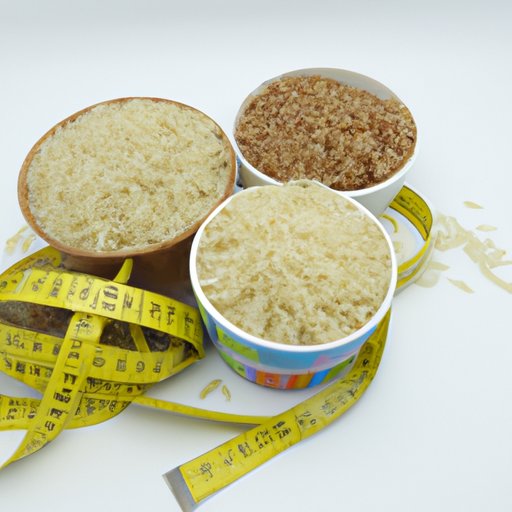
Introduction
When it comes to weight management, there are many myths and misconceptions surrounding certain foods, including the staple of many diets: rice. Some people believe that rice causes weight gain, while others tout its potential benefits for weight loss and overall health.
Understanding the relationship between rice and weight management is crucial for making informed decisions about diet and achieving fitness goals. In this article, we’ll explore the truth about rice and weight gain, its potential role in weight loss, and the overall impact of rice consumption on health and wellness.
The Truth About Rice and Weight Gain: Separating Fact from Fiction
One of the most common misconceptions about rice is that it is a major cause of weight gain. However, the truth is that weight gain is caused by an excess of calories consumed compared to calories burned, and not simply by the consumption of rice or any other individual food.
Carbohydrates, which are present in rice as well as many other foods, have also gotten a bad reputation in some health circles. However, the body needs carbohydrates for energy, and they can be part of a healthy and balanced diet.
Instead of demonizing any one food, it’s important to focus on calorie balance and ensuring that the number of calories consumed is equal to or less than the number of calories burned through activity and exercise.
Rice and Weight Loss: Are They Compatible?
Rice can actually be a helpful component of a weight loss plan for several reasons. Firstly, it is low in fat and high in fiber, which can help create a feeling of fullness and reduce the overall number of calories consumed.
White rice, while still a source of carbohydrates, is less nutritionally dense than brown rice and can contain more added sugars or salts, which contributes to unhealthy weight gain.
Portion control is also an important factor when consuming rice as part of a weight loss diet. Rather than cutting it out entirely, incorporating modest and portion-controlled servings of rice into meal plans can help with weight loss efforts.
Rice: A Diet Disaster or Healthy Staple?
The nutritional content of rice varies depending on the type of rice and how it is prepared. Brown rice, for example, is high in fiber and nutrients like manganese and selenium, which are crucial for overall health. White rice, on the other hand, is low in fiber and minerals but can be enriched with vitamins and nutrients for more nutritional value.
While rice can be a healthy staple in a balanced diet, it is important to note that some rice dishes, particularly those found in restaurants or fast food establishments, can also be high in fat, calories, and sodium thanks to the preparation and added ingredients. To ensure rice is optimally nutritious, choosing less processed variations and fresh, healthy ingredients is crucial.
The Role of Rice in a Balanced Diet
A balanced diet is key to overall health and wellness. This means consuming a variety of nutrient-dense foods that deliver the vitamins and minerals necessary for optimal functioning.
Rice can be a suitable component of a balanced diet due to its high carbohydrate content and various nutrients, particularly vitamin B, iron, and magnesium. When incorporated into well-rounded meal plans alongside lean proteins, healthy fats, and fruits and vegetables, rice can provide the energy needed for lifestyle and fitness goals.
Can Rice Actually Help You Lose Weight? Experts Weigh In
There have been several studies on the relationship between rice and weight loss, with mixed results. Some studies have shown that incorporating rice into a lower-calorie diet can actually result in weight loss due to the high fiber, low-fat content of the meal plan as a whole.
Additionally, some experts have noted that rice consumption can have metabolic benefits for weight loss thanks to its impact on glucose levels and insulin sensitivity. However, as with any weight loss plan, individual factors like age, activity level, and overall health need to be considered. Consulting with a registered dietitian can help tailor a plan which includes the right amount and variety of rice for individual goals and needs.
How to Incorporate Rice into a Low-Calorie Diet
For individuals specifically looking to lose weight or maintain a healthy weight, a low-calorie diet is a popular approach. Incorporating rice into a low-calorie diet can be done in a variety of ways. Using cauliflower rice as a substitute for high-calorie white rice is a great option. Additionally, using smaller portions of rice or bulking up dishes with vegetables or lean protein can make the overall meal plan more nutritious and lower in calories.
Some healthy rice recipes for low-calorie diets include cauliflower rice stir-fry, vegetable rice soup, and spicy shrimp and brown rice.
The Impact of Rice Consumption on Overall Health and Weight Management
Overall, rice consumption can be beneficial for health and weight management when incorporated into a well-rounded, balanced diet. As with any individual approach to nutrition, a verified understanding of rice and its nutritional differences is key, as is a focus on moderation and portion control.
By choosing nutrient-dense rice options, crafting healthy and balanced meal plans, and seeking expert advice, weight loss and maintenance goals can be achieved alongside optimal overall health and wellness.
Conclusion
Rice is often cited as a cause of weight gain or a staple food for weight loss. However, the truth is somewhere in between. Rice can be a valuable component of a healthy and balanced diet, providing carbohydrates and important vitamins and minerals. However, it is important to pay attention to serving sizes and portions, as well as the nutritional content of rice in various forms. Overall, consulting with a registered dietitian and making informed decisions about rice consumption are crucial for achieving and maintaining weight management goals and optimal overall health.




